Matt Rees's Blog - Posts Tagged "turkey"
The Writing Life interview: Barbara Nadel
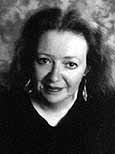
One of the jobs authors are required to perform to help promote their work is the strange task of procuring from other authors something called a “blurb”—the praise you’ll find on the back cover of books. They ought to come from authors whose readers might also be interested in your book--that's the idea. In 2006, when I sent out advance copies of my first novel “The Collaborator of Bethlehem,” I had no doubt I wanted one to go to Barbara Nadel, winner of the Crime Writers Association Silver Dagger the previous year. Her fabulous series of novels about Istanbul detective Cetin Ikmen delves into a society that we think we know a great deal about – only to demonstrate how much more complex is the reality. That’s one of the things I was trying to do with my Palestinian detective Omar Yussef. I’m pleased to report that Barbara recognized that, and she was kind enough to read and comment (favorably!) on my book. She’s published 11 terrific Turkish novels and is about to publish a new novel in her other series, in which the hero is a London undertaker. The two series are rather different and make varied demands on this intelligent writer, so I thought it’d be fascinating to ask her about The Writing Life.
How long did it take you to get published?
I first started trying to get published in 1992. At that time the notion of a mystery book, much less a series set in Turkey, was rejected as almost laughable. I’ll be honest, I gave up and put my first book Belshazzar’s Daughter in a drawer for 7 years. The only reason I ever took it out again was because in 1999 I was, yet again, totally broke and I thought, ‘why not give this old thing one more go? Maybe someone will give me some cash?’ So I sent it to an agent who, on this occasion, liked it. The next thing I knew I was involved in a three book contract! Now ten years on, I write two mystery series; the Inspector İkmen stories set in modern Turkey and the Francis Hancock mysteries set in 1940s London.
Would you recommend any books on writing?
I have to admit that I’ve never read any!
What’s a typical writing day?
I live in the north of England and so my first task of the day is to look out of the window and see what the sky is doing. That done, I try to get to my desk by about 8am and then work through until lunchtime. I don’t generally do lunch – a legacy of past chain-smoking – but just have a cup of tea and maybe, just occasionally, a cigarette. I’ll then work through until about 5 or 6pm. I don’t do this every day but try to work this schedule Monday to Friday if I can. I have pretty heavy family commitments and so it’s not always possible.
Plug your latest book. Why is it so great?
I have two books out next month, one paperback, an İkmen mystery called River of the Dead, and a new Hancock hardback called Sure and Certain Death.
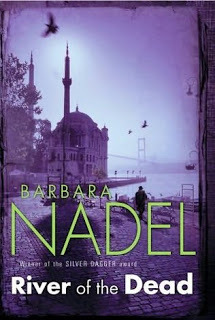
River of the Dead sees İkmen and his protégé Suleyman, in pursuit of an escaped prisoner. Yusuf Kaya is a murderer and drug dealer and when he escapes from prison in İstanbul it is suspected he has had help. Also because Kaya’s home town is in eastern Turkey it is strongly suspected he has gone back there. And so while İkmen pursues the investigation in İstanbul, Suleyman flies out to the eastern city of Mardin. There he finds not only drug dealing, gun running and the threat of terrorist attack, but also an exotic mix of people including Kurds, Suriani Christians and those who believe in an ancient snake goddess, the Sharmeran. This book came about as a result of a trip I made out to Mardin in 2007 and is I hope imbued with the same sense of magic and unreality that I found there. That said River of the Dead is also a tough book which address very real issues I talked to people about in Mardin, like the Iraq war. I think it’s great because although it is a crime story it is also a social commentary as well as, hopefully, introducing some people to the glories of south eastern Turkey.
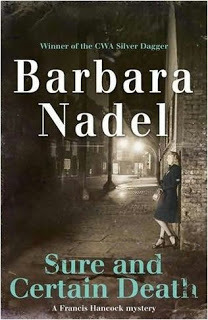
Sure and Certain Death is about a series of killings that take place in the London Borough of West Ham in 1941. Middle aged women are being attacked and eviscerated. Local people start whispering about Jack the Ripper being on the prowl again. One such victim is discovered in a bombed out house by undertaker Francis Hancock. A veteran of World War I, Francis suffers from shell-shock which means that sometimes he doesn’t always know that what he is experiencing is actually real. But soon the murders come close to home and he finds himself fearing for his own sister. Sure and Certain Death is a story about World War 2 that has its murderous roots in the darkest corners of Word War 1. I think it’s a good book because it is not either an obvious murder story or a straightforward story of the London Blitz. My father experienced the Blitz when he was a child and although the Hancock books do tell of the heroism of that time, they also aim to tell it like it was too. Francis Hancock’s world is therefore one of privation, dirt, anxiety and sometimes madness.
How much of what you do is dictated by genre formula, personal formula or complete originality?
My aim is always not to write to formula but to produce something fresh every time. However within the crime/mystery genre there are certain constraints, like having a ‘tidy’ ending. Not to do this is unsatisfying for the reader, even though I do sometimes want to reflect the sheer messiness of real life. In addition series characters do have back stories which have to be addressed in some form in every book and so formula could be said to apply there too. In the main however I don’t write to formula.
What’s your favourite sentence in all literature and why?
From Great Expectations by Charles Dickens. These are the first words Miss Havisham ever speaks to Pip. They sum up both the bitterness and the tragedy of her situation perfectly.
‘This,’ said she, pointing to the long table with her stick, ‘is where I shall be laid when I am dead. They shall come and look at me here.’
She knows that her relatives will only ‘come and look’ at her. They won’t grieve. They are only interested in her money. All this is conveyed so well in this cold little sentence.
How much research is involved in each of your books?
Quite a lot, although of course it does depend on the book. For River of the Dead I had to go to Mardin and its environs and talk to people so that was pretty full-on. With the Hancock series of course I have to do historical research into aspects of World War 2 every time. Enjoyable but time consuming.
Do you live entirely off your writing? How many books did you write before you could make a living at it?
For the first 6 years of my writing career I couldn’t make my living just from my books. I had a day job in a psychiatric hospital and wrote at night and at weekends. Since the Hancock series began however (4 years ago) I have (just) been able to survive on writing. However it’s not easy and I do have to supplement my income by writing short stories and bits of journalism.
How many books did you write before you were published?
I had one academic book published before ‘Belshazzar’s Daughter’ but no fiction. Not that I didn’t try. I wrote two books which I haven’t had published. Goodness knows if they’ll ever see the light of day!
What’s the strangest thing that ever happened to you on a book tour?
Meeting an old man who was called Mr İkmen and then, not twenty four hours later, seeing a Turkish policeman who looked just like my internal vision of İkmen’s protégé, Suleyman!
What’s your weirdest idea for a book you’ll never get to publish?
A horror story about a Victorian side-show man who kills people and then places them in sentimental tableau which he charges the public one penny to view. Ghastly and weird and clearly the product of a brain that is not what it should be. Mind you, Goths would like it I am sure!
Back to diplomacy school for Israel
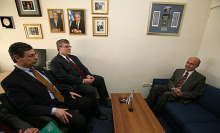 JERUSALEM, Israel — The American humorist Caskie Stinnett once wrote that “a diplomat is a person who can tell you to go to hell in such a way that you actually look forward to the trip.” In other words, someone who doesn’t make his meaning so clear that one is both afraid of the trip to hell and angry about being sent there.
JERUSALEM, Israel — The American humorist Caskie Stinnett once wrote that “a diplomat is a person who can tell you to go to hell in such a way that you actually look forward to the trip.” In other words, someone who doesn’t make his meaning so clear that one is both afraid of the trip to hell and angry about being sent there.Which makes Israel’s two top “diplomats” rather less than diplomatic.
Deputy Israeli Foreign Minister Danny Ayalon caused turmoil in relations with Turkey last week when he decided to upbraid the Turkish ambassador. Ayalon and his boss, Foreign Minister Avigdor Lieberman, wanted to let the Turks know that they found it unacceptable that a Turkish TV drama portrayed Israeli agents kidnapping children and the Israeli ambassador’s assassination.
Ayalon kept the Turkish ambassador hanging around in an anteroom, in front of cameras from two Israeli news channels. When he brought him and the cameras into his office, he sat the unfortunate envoy in a low sofa and perched stony-faced on his own, much higher chair. Between them on the coffee table stood a single Israeli flag about the size of a pocket handkerchief.
Then he turned to the cameras and said, in Hebrew: “Pay attention that he’s sitting in a low chair and we’re higher up, and there’s no Turkish flag here, and we’re not smiling.” The cameramen suggested a handshake. “No,” said Ayalon. “That’s the whole point.”
In the Oxford Dictionary I keep on my desk, “diplomacy” is described as “skill in managing international relations; adroitness in personal relationships, tact.” Perhaps Ayalon, who’s always been rather charming and intelligent when I’ve met him, ought to keep a copy on his desk. Maybe he put it in the drawer with the little Turkish flag he stands on the coffee table, when he isn’t trying to show the Turkish ambassador that he’s angry with him.
The following day, the Turkish ambassador spoke out in an interview with an Israeli newspaper. “How could he be so rude?” he said.
That was essentially the reaction in Israeli newspapers, whose journalists are no fans of Foreign Minister Lieberman, an indelicate former night-club bouncer whose burliness and Moldovan birth make him — in the eyes of the press — rather unqualified to tread the minefield of politesse that is international diplomacy.
Ayalon issued an equivocal apology after a day. But the Turks insisted on a fuller apology, which came after the Turkish president said Ankara might recall its ambassador.
“I wish to express my personal respect for you and the Turkish people,” Ayalon wrote to the Turkish ambassador, “and assure that although we have our differences of opinion on several issues, they should be discussed and solved only through open, reciprocal and respectful diplomatic channels.”
On the same day Ayalon told the Israeli parliament that because of his protest “Israel is respected more.” Presumably he means that the Turks will be satisfied with the apology but will tread more carefully in the future lest their representative find himself sinking into a low chair without a nice Turkish flag to cling onto.
Why do relations with Turkey matter so much to Israel, and why did things get so bad this week?
Turkey is a major client of Israel’s defense industries. Despite the diplo-spat, Defense Minister Ehud Barak is in Turkey for an official visit during which he’ll discuss some important new military contracts. Last month Turkey said it’d push ahead with a $190-million deal to buy drones from Israel Aerospace Industries.
Some Israeli commentators believe Lieberman and Ayalon, whose party Israel Our Home sits uncomfortably in the cabinet alongside Barak’s fractious Labor Party, engineered the tension to embarrass the defense minister.
More likely Lieberman had had enough with Turkish vilification of Israel. That began a year ago, when Turkey was one of the most outraged opponents of the war Israel waged on Hamas in the Gaza Strip. The reaction back then included a surprisingly undiplomatic outburst at the economic conference in Davos, when Turkish Prime Minister Recep Erdogan berated Israeli President Shimon Peres and stormed off the stage because the host told him it was time to end the panel and go to dinner.
Since then, Israeli diplomats maintain, Erdogan has missed no opportunity to lambast Israel. In Lebanon last week, Erdogan argued that Israel’s nuclear capability ought to be treated the same way as Iran’s nuclear program, and also said Israel threatens “world peace.”
The Israeli diplomats say the Turkish TV show was the last straw for Lieberman and provided a veiled way of punishing Erdogan for his aggressive statements.
In which case, it was actually quite diplomatic.
GlobalPost
Published on January 21, 2010 23:40
•
Tags:
avigdor-liebermann, danny-ayalon, dipolomacy, foreign-minister, foreign-relations, global-post, israel, journalism, middle-east, recep-erdogan, shimon-peres, turkey
'Exotic' crime fiction makes unpalatable places bearable
 “Exotic” crime fiction has taken off in the last decade. People want to read about detectives in far-off places, even if they don’t want to wade through learned histories of those distant lands.
“Exotic” crime fiction has taken off in the last decade. People want to read about detectives in far-off places, even if they don’t want to wade through learned histories of those distant lands.Many of the biggest selling novels of the last decade have been “exotic crime.” You’ll find a detective novel set almost everywhere in the world, from the “Number One Ladies Detective Agency” in Botswana through Camilleri’s Sicily to dour old Henning Mankell in the gloomy south of Sweden.
The success of my co-bloggers at International Crime Authors – with their detectives plying their trade in Thailand, Laos, and Turkey, alongside my Palestinian sleuth Omar Yussef – is also proof that this taste for international crime is more than just a publishing fad. The novels aren’t just Los Angeles gumshoe stuff transported to colder or poorer climes.
Here’s what I think is behind it:
Read a history book or a book of contemporary politics. Often you’ll find a list of the enormous numbers of people destroyed around the world by war and famine and neglect. You won’t get any sense that the world…makes sense. Crime fiction doesn’t purport to save the planet, but it does demonstrate that one man – the detective – can confront a mafia, an international espionage organization, a government and come out with at least a sliver of justice.
And justice is one of the few ideas which can still inspire.
Readers also prefer crime fiction about distant countries over so-called “literary” fiction about such places.
That’s because crime fiction gives you the reality of a society and also, by definition, its worst elements — the killers, the lowlifes — but it also gives you a sense that a resolution is possible. (See above.)
Literary fiction, by contrast, often simply describes the degradation of distant lands. If you read Rohinton Mistry’s “A Fine Balance,” for example, you probably thought it was a great “literary” book, but you also might’ve ended up feeling as abused as his downtrodden Indian characters without the slightest sense of uplift.
Crime fiction doesn’t leave you that way.
Now, that’s also true of the Los Angeles gumshoe. But the international element gives us something else to wonder about in these new novels. Not just because the scene is alien. Rather, it’s because we all trust to some extent that bad guys in Los Angeles will go to jail — or become Hollywood producers. We have faith in the system. So a detective has some measure of backing from the system, and consequently novelists have to push credibility to its limits in order to make him look like he’s taking a risk, to make him look brave.
International crime, when it’s set in the Developing World in particular, can’t be based on that same trust in the just workings of the system. The lack of law and order in Palestine, as I observed it as a journalist covering the Palestinian intifada, was one of the prime reasons I had for casting my novels as crime novels. It was clear the reality wasn’t a romance novel. Gangsters and crooked cops in the West Bank suggested the more vibrant days of the US crime novel back in the time of Chandler and Hammett, when it was much harder to argue that a city or mayor or police chief wouldn’t be in the pocket of the bad guys.
When a detective goes up against such odds in international crime fiction, it’s truly inspiring.
For books that start with a murder, that’s not what you’d expect, but it’s the reason for the success of this new exotic avenue of the crime genre.
Published on May 13, 2010 01:37
•
Tags:
a-fine-balance, alexander-mccall-smith, andrea-camilleri, crime-fiction, dashiell-hammett, detective-fiction, exotic-crime, henning-mankell, italy, laos, los-angeles, middle-east, omar-yussef, palestine, palestinians, raymond-chandler, rohinton-mistry, sweden, thailand, turkey
Israel prepares for next threat--nuclear?
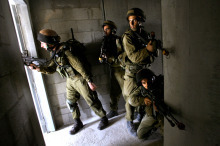 NABLUS, West Bank — During the Palestinian intifada, I sat on a dusty hilltop overlooking this most violent of West Bank towns with a dozen of the top Israeli officers in the area. The brigade commanders told their regional chiefs that all the police work and house-to-house fighting of the intifada had made their troops ill-prepared for a real war. “If we had to fight in Lebanon, my men wouldn’t know what they were doing,” shouted one.
NABLUS, West Bank — During the Palestinian intifada, I sat on a dusty hilltop overlooking this most violent of West Bank towns with a dozen of the top Israeli officers in the area. The brigade commanders told their regional chiefs that all the police work and house-to-house fighting of the intifada had made their troops ill-prepared for a real war. “If we had to fight in Lebanon, my men wouldn’t know what they were doing,” shouted one.In 2006, that prediction was proven largely true, as Israeli forces were matched on the ground by Hezbollah’s militia. The air- and missile-warfare that went on over their heads was devastating to Lebanese and Israeli civilians, but Israel’s military planners were shocked by the difficulties faced by their ground troops.
For Israel, the threat these days is clear. Nablus is quiet, its gunmen subdued by Palestinian police who are trained with American help and the economy bolstered by American aid. This week, Israeli soldiers will run through a series of exercises to practice for a potential conflict with Hezbollah on the country’s northern border.
The main unknown in those exercises: How long does Israel have before the threat of nuclear attack will come into play?
Israeli government officials and security chiefs are reluctant to talk about how Israel might respond if Iran succeeds in obtaining nuclear weapons. They prefer to emphasize the destabilization of the international balance of power should such a situation arise. “We should focus on prevention,” Intelligence Minister Dan Meridor told international journalists last week. “Prophylactics, rather than dealing with unwanted results.”
So the disdain in Jerusalem was absolute for the Turkish-Brazilian deal announced last week under which Iran would ship some of its uranium to Turkey. To use Meridor’s biological analogy, that was about as much use as a prophylactic with a big hole in it. The Iranians were playing for time, Israeli officials said, and the United States was right to override the deal and go for strong sanctions.
Trouble is, most Israeli officials don’t expect those sanctions to work any more. Israel is starting to come to terms with a burgeoning Middle Eastern nuclear arms race. It will start the race with a lead — it has had nuclear weapons for four decades. But with Iran coming up on the rails and Saudi Arabia and Egypt, unwilling to be potentially threatened by Tehran, soon joining the competition, the dangers to the Jewish state are considerable.
It’s de rigueur for international strategists to say that Israel isn’t the country that should be most worried by Iranian nuclear ambitions. Instead, they posit the Gulf states, Shia Iran’s Sunni Muslim rivals, as the most at-risk.
There’s something to that. Yet Iran’s biggest success in exporting Islamic Revolution has been through Hezbollah in Lebanon. It also now has a direct line to Gaza with Hamas, which it helps to bankroll. Both would be easy places from which to use nuclear capability to influence regional — or even world — events.
Israel’s response to the Iranian move toward nukes is complicated. Its actions are limited. A potential aerial attack on Iran’s nuclear facilities would be difficult without bunker-buster bombs or coordination with the U.S. and the Arab countries over which Israeli jets would have to fly.
Diplomatically, Israel has little faith that sanctions can do anything more than delay an Iranian bomb. Why? Because it has experience of its own in negotiating about an issue so long that its negotiating partner in the end accepts a sliver of what it had originally asked for — and even then the negotiations can start again without reference to previous deals.
That’s a familiar tactic in Jerusalem, which has frequently confounded Western negotiators. Just as Iran has infuriated Washington with the sanctions issue, agreeing to something when total breakdown seemed imminent and pulling back just before it was required to act.
In public, at least, Israeli officials are forced to push for stiff sanctions, as if they thought that'd make a difference. But rather than believing Iran’s nuclear program will be ended, they view the sanctions as a way of buying time for Israel to prepare its troops exercises like those this week and to ready more advanced missile defenses.
Congress this week voted for President Barack Obama’s plan to give $205 million to Israel to fund its short-range missile defense system. That’s vital to Israel now, given Hamas’ rockets in Gaza, which have Tel Aviv in range, and Hezbollah’s ability to hit any place in Israel with some of its 42,000 missile arsenal. But it will only be more important once the equation has a nuclear component.
(I posted this on Global Post.)
Published on May 23, 2010 01:46
•
Tags:
brazil, crime-fiction, dan-meridor, gaza, global-post, hamas, hezbollah, iran, israel, israeli-army, israelis, jerusalem, journalism, lebanon, middle-east, nablus, nuclear-weapons, palestine, palestinians, tehran, turkey, west-bank
Big acts cancel, Israel's opera goes on
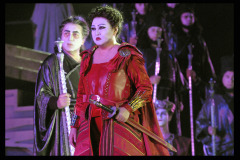 MASADA, Israel — A parade of bejeweled camels, elaborately costumed warriors and prancing horses crossed the stage. Jerusalem had fallen to a conqueror from the east. The high priest predicted disaster and the wrath of a vengeful deity. Three hours later, with searchlights flitting across the rugged face of this ancient fortress, the Jews were freed, the conqueror stood in awe of the God of the Jews, and, oh yes, a fat lady sang.
MASADA, Israel — A parade of bejeweled camels, elaborately costumed warriors and prancing horses crossed the stage. Jerusalem had fallen to a conqueror from the east. The high priest predicted disaster and the wrath of a vengeful deity. Three hours later, with searchlights flitting across the rugged face of this ancient fortress, the Jews were freed, the conqueror stood in awe of the God of the Jews, and, oh yes, a fat lady sang.The Israeli Opera last weekend put on the first performances of its “Nabucco,” Giuseppe Verdi’s greatest early success from 1842, around about where the Romans camped in A.D. 73 when they besieged the 1,300-foot heights of Masada. The company, which is based in Tel Aviv, intends this extravaganza to inaugurate a new annual outdoor opera festival. (There’s also a performance by the great American soprano Jessye Norman, whose services, it should be noted, do not come cheap.)
It might seem a risky proposition to start an annual outdoor opera festival at a time when Israel is isolated not only politically but, increasingly, in the cultural sphere. Pressure from boycott campaigners persuaded Elvis Costello last month to cancel open-air concerts at another historic venue — the Roman amphitheater in Caesarea. This week, alternative rockers The Pixies joined Carlos Santana and Gil Scott-Heron in pulling out of shows in Israel. Pro-boycott protesters have turned their attention to other performers with dates scheduled for Israel this summer, including Elton John.
Read the rest of this post on my blog The Man of Twists and Turns.
Published on June 09, 2010 11:59
•
Tags:
artistic-boycott, bible, blockade, boycott, carlos-santana, crime-fiction, elton-john, elvis-costello, flotilla, gaza, gideon-levy, gil-scott-heron, giuseppe-verdi, hannah-munitz, iran, israel, israeli-opera, italian-opera, jerusalem, jessye-norman, jews, john-lydon, johnny-rotten, masada, middle-east, moshe-ya-alon, nabucco, nebuchadnezzar, palestinians, pil, sodom, the-pixies, the-sex-pistols, turkey
Cheers for Hitler, and Brits go home
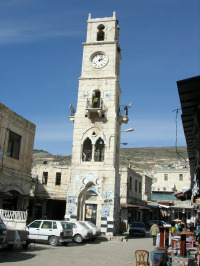 The company you keep can put the culture around you in a new light, let you see it as you haven’t before.
The company you keep can put the culture around you in a new light, let you see it as you haven’t before.That’s true when I travel to different countries and discover that readers in Germany have a particular take on my Palestinian crime novels which differs from the way they look to Americans, for example.
I got to thinking about this when I was wandering the Nablus casbah this week with two German friends. An enthusiastic Palestinian fellow asked me to explain to them how much he appreciated Hitler, and as an afterthought he noted that all his people’s problems are caused by me and my compatriots from the British Isles.
I had just climbed up the old Turkish clocktower in Manara Square at the heart of the casbah with one of the Germans. I’d never seen the door at the bottom open before, but there was a policeman inside on this occasion and he generously allowed us to go up the ladder. On the first balcony, I stepped through more pigeon feces than I’d have thought could possibly gather in one place. It was crusty for an inch or two, then a little slushy beneath. I had a grin all over my face of the kind that tends to appear there when I discover a new corner in a place I’ve often been – and loved being there – before.
Read the rest of this post on my blog The Man of Twists and Turns.
Published on June 17, 2010 01:33
•
Tags:
barry-unsworth, bedouin, berlin, crime-fiction, damascus, dehaisha-refugee-camp, george-w-bush, germany, hamas, hitler, imperial-camel-corps, jerusalem, middle-east, nablus, omar-yussef, ottomans, palestine, palestinians, the-rage-of-the-vulture, the-samaritan-s-secret, tony-blair, turkey, wales
Paving Zion to put up a parking lot
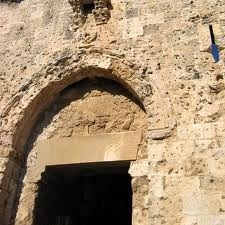 Intifada fans can breathe a little more easily.
Intifada fans can breathe a little more easily.Just when it seemed as though no amount of building in Israel’s settlements and harsh statements at the United Nations by the country’s foreign minister could truly provoke new violence between Israelis and Palestinians, the Jerusalem municipality came up with something guaranteed to steam up some hotheads.
The city’s planning committee is considering a proposal to build an underground parking lot for the Old City by breaching the 16th-century walls of Suleiman the Magnificent and digging into the rock beneath the ancient Jewish Quarter.
“This is illegal,” said Ghassan Khatib, director of the Palestinian Authority’s government media center in Ramallah. “These illegal changes would provoke the Palestinians and many others, Muslims and Christians. This will aggravate the tension between Israelis and Palestinians and have a negative effect on current international efforts to renew the political process.”
Over the years, Palestinians and Islamists have called for violence to protect, as they put it, the Old City from alleged Israeli plots to undermine it and bring the Aqsa Mosque, considered the third holiest shrine in Islam, tumbling down. Such conspiracies always seemed somewhat far-fetched, though nonetheless effective for all that.
This time, Jerusalem’s city government seems set on mirroring some aspects of the most vivid Palestinian paranoia.
For the rest of this post, read my blog The Man of Twists and Turns.<\a>
Published on October 11, 2010 05:59
•
Tags:
aqsa-mosque, armenian-quarter, christian-quarter, dung-gate, ghassan-khatib, global-post, herod-s-temple, intifada, israel, israelis, jaffa-gate, jerusalem, jerusalem-municipality, jewish-quarter, journalism, kotel, muslim-quarter, new-gate, old-city, ottoman-empire, palestine, palestinians, planning, ramallah, ruth-lapidoth, suleiman-the-magnificent, turkey, unesco, zion-gate



